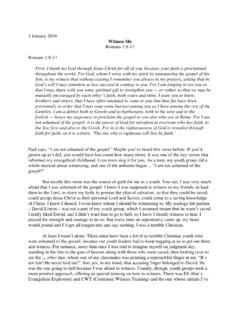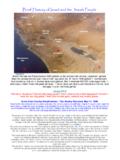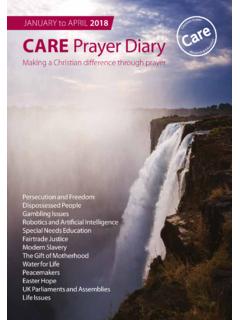Transcription of Conversation . . . or Doctrine John 3:1-21 we saw his ...
1 28 February 2016 Conversation .. or Doctrine John 3:1-21 The Gospel of John includes reports of several one-on-one encounters that Jesus had. Last week we saw his meeting with a Samaritan woman. Today we read John chapter 3, verses 1-21: Now there was a Pharisee named Nicodemus, a leader of the Jews. He came to Jesus by night and said to him, Rabbi, we know that you are a teacher who has come from God; for no one can do these signs that you do apart from the presence of God. Jesus answered him, Very truly, I tell you, no one can see the kingdom of God without being born from above. Nicodemus said to him, How can anyone be born after having grown old? Can one enter a second time into the mother s womb and be born? Jesus answered, Very truly, I tell you, no one can enter the kingdom of God without being born of water and Spirit.
2 What is born of the flesh is flesh, and what is born of the Spirit is spirit. Do not be astonished that I said to you, You must be born from above. The wind blows where it chooses, and you hear the sound of it, but you do not know where it comes from or where it goes. So it is with everyone who is born of the Spirit. Nicodemus said to him, How can these things be? Jesus answered him, Are you a teacher of Israel, and yet you do not understand these things? Very truly, I tell you, we speak of what we know and testify to what we have seen; yet you do not receive our testimony. If I have told you about earthly things and you do not believe, how can you believe if I tell you about heavenly things? No one has ascended into heaven except the one who descended from heaven, the Son of Man.
3 And just as Moses lifted up the serpent in the wilderness, so must the Son of Man be lifted up, that whoever believes in him may have eternal life. For God so loved the world that he gave his only Son, so that everyone who believes in him may not perish but may have eternal life. Indeed, God did not send the Son into the world to condemn the world, but in order that the world might be saved through him. Those who believe in him are not condemned; but those who do not believe are condemned already, because they have not believed in the name of the only Son of God. And this is the judgement, that the light has come into the world, and people loved darkness rather than light because their deeds were evil. For all who do evil hate the light and do not come to the light, so that their deeds may not be exposed.
4 But those who do what is true come to the light, so that it may be clearly seen that their deeds have been done in God. Last week, we saw Jesus encounter a scandalous Samaritan woman, and we talked about the challenge of creating a community that can include people like her, people who are ostracized by society and even by most religious groups. We talked about a community without judgment of others. This week we have a very different encounter. This time Jesus meets an insider: a respected religious leader, a member of the priestly council named Nicodemus. Nicodemus has heard of the mighty deeds Jesus has done and has come to hear his teachings. The fact that he came at night might mean he doesn t want the rest of the council to know, but the fact that he came at all, and that twice he calls him teacher indicates that he sincerely wants to hear what Jesus has to say.
5 But if his goal is to determine whether Jesus teaches good Doctrine , that goal is frustrated at every turn. Jesus doesn t give him any Doctrine to assess. Instead he starts talking about the importance of personal transformation you must be born from above (or another possible translation, born again ). This isn t what Nicodemus is looking for but he tries to engage it: How can someone who is old get back into the womb and be reborn? Jesus replies, You must be born of the Spirit, not just of water. And the Spirit can t be explained. It blows where it wants. It s a mystery. Nicodemus protests: What do you mean? How can these things be? But Jesus doesn t reply. Instead he says, basically, Aren t you a teacher of Israel?
6 You figure it out. Then, in case that wasn t discouraging enough, he adds, No one really understands except the Son of Man. So here s what you need to know: God loved the world and sent his only Son, so that through him those who believe might have eternal life. He sent him not to condemn but to restore. Poor Nicodemus. He came to hear Jesus views on the key doctrines of the day. Here are the issues that convulsed the council: What is the Bible? Is it only the Torah inspired, or do the Prophets count? Is there a resurrection from the dead? When? Are there angels? How many? One per person? But for the most part Jesus ignores them. He talks about trusting in God s love so as to be reborn as a new creature and embracing mystery.
7 Now, I don t know where Jesus went to seminary, but that s simply not how it s done today. At least since the Protestant Reformation, 500 years ago, we ve been all about Doctrine . It s how we know who we are. Are we saved by grace or by works? Grace people in this group; works people in that one. Are we predestined for salvation, or do we choose it? Free will people through this door; everyone else through that one. Scripture inspired but not inerrant, over here. Inspired and inerrant against that wall with the young earth creationist inerrantists on the left and old earth creationist inerrantists on the right. Now, let s talk about women: I need the women can preach people here, the women can teach ones here, the women can teach, but only other women and children folks here, the women can listen and be quiet people here, and the women can wear hats people over here.
8 I could go on and on about the divisions we make by means of Doctrine . It sometimes seems that s all that matters to us. I had coffee with a visitor last year who wanted to ask me about our church. He liked the community, but he was concerned about our Doctrine . As he put it, an airplane flying across the world with just the tiniest error in its navigation computer is going to end up thousands of miles off course. In other words, our very salvation depends on getting our theology right. There is no room for error. As I said, we have been all about Doctrine . And it s driving some people crazy. And it s driving some people away. We ve been looking at the book Church Refugees, about people who having been deeply involved in church at one time have left the church entirely.
9 Last week we talked about how many leave because they are looking for a more genuine and accepting community, people who love each other despite differences. That applies to differences in Doctrine as well. If you can t tolerate people who have different ideas, then you aren t offering true community. As Josh Packard, the study s author, puts it, Churches frequently want to make sure that everyone signs on to a common belief system before they can begin to do life with each other. This is not only a dubious way to practice Christianity .. but also a profoundly ineffective way to build community ( ). But it s more than just feeling that certain ideas are excluded; often it s being forbidden to entertain new ideas at all forbitten to ask questions.
10 When Packard asked these de-churched people if they had been discouraged from asking questions, he received a resounding, deeply felt, and unanimous Yes! To a person, they had encountered the attitude that their church already had all the questions resolved, and they just needed to learn the correct answers. But they weren t looking for the correct answers. They were looking for something else: Conversation . As Jill, a woman interviewed in the study, put it, It s in relationships and conversations that I find God. It s not a real Conversation if you re trying to convert me to your position.. [It s] not a relationship either (p. 78). Another respondant, a man named Liam, says, I wasn t looking for agreement. Like, I didn t need the pastor to proclaim Darwin from the pulpit.







